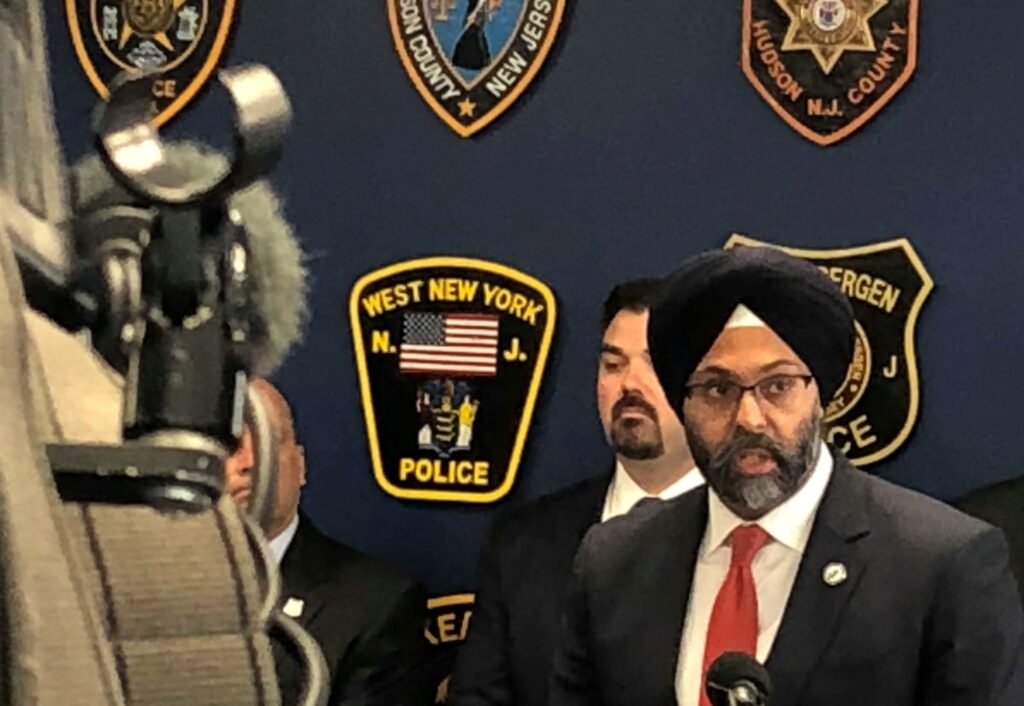Grewal Announces New Measures and Issues Guidance to Address Law Enforcement Manpower Challenges During COVID-19 Pandemic

Attorney General Grewal Announces New Measures and Issues Guidance to Address Law Enforcement Manpower Challenges During COVID-19 Pandemic
Links: www.nj.gov/oag/newsreleases20/2020-0406-Law-Enforcement-Guidance.pdf
https://www.nj.gov/oag/newsreleases20/2020-0406-Exhibit-EO-115.pdf
TRENTON – Attorney General Gurbir S. Grewal today announced a series of measures to help law enforcement address the manpower challenges that result from officers being sick or quarantined at a time when unprecedented demands are being placed upon them.
Attorney General Grewal announced the following steps, among others:
- Facilitating the hiring of retired officers as Special Law Enforcement Officers (SLEO IIs);
- Offering guidance through the Police Training Commission (PTC) for police departments to use recruits in more supporting roles; and
- Establishing training through the Division of Criminal Justice for military police and security personnel in the National Guard in case they are activated for law enforcement duties.
“Law enforcement officers are facing a perfect storm when it comes to manpower, because they are being called on to tackle new challenges and take on more responsibilities in the battle against this pandemic—at the very time that hundreds of officers are battling COVID-19 or are quarantined,” said Attorney General Grewal. “Not since 9/11 or Superstorm Sandy have law enforcement across our state experienced such strain, and some of the steps we are outlining to address the manpower challenges mirror the steps we took after those events. Our officers are working courageously and tirelessly to protect us during this crisis, and I am grateful for their partnership. I am committed to doing everything in my power to assist law enforcement, because they deserve nothing less.”
Hiring Retired Officers. Attorney General Grewal today announced new policies to enable police departments to hire as SLEO IIs retired officers who previously served in good standing in New Jersey. They must meet the training requirements for SLEO IIs, but any officer who retired less than three years ago will be presumed compliant, and the PTC will process waivers for most training requirements expeditiously, consistent with established procedures. SLEO IIs, while on duty, can exercise the full powers and duties of a regular police officer.
Attorney General Grewal also laid out how law enforcement agencies can hire retired officers for administrative roles, as the New Jersey State Police and police departments across New Jersey did following 9/11 and Superstorm Sandy. Hiring retired officers in non-law enforcement titles serves to free officers assigned to administrative units for roles in the field.
Expanding Duties for Police Recruits. With New Jersey’s law enforcement academies closed, law enforcement agencies can use recruits who have not completed basic training in administrative roles. Attorney General Grewal recommended that police departments expand the duties to which recruits are assigned, as long as they are not assigned to perform law enforcement functions. They can assist with dispatching responsibilities, processing of prisoners, citizen inquiries, and similar responsibilities, which allows other officers to focus on the COVID-19 response.
This guidance relating to the rehiring of retired officers and use of recruits builds on prior efforts announced by the Attorney General to expand law enforcement capacity. Among other things, the Attorney General previously announced that the Department was expediting the process by which SLEO IIIs—who are limited by statute to performing duties on school or college grounds—can be re-designated as SLEO IIs. To date, the PTC has approved approximately 200 waivers of additional training requirements in order to expedite that process, typically in less than 24 hours.
National Guard Training. At the same time, Attorney General Grewal announced that his Office, through the Division of Criminal Justice, has established a bridge training for security personnel and military police officers within the National Guard so that they will be ready to conduct limited law enforcement actions if called upon in the emergency. The training is a proactive measure to ensure National Guard members—limited to those with prior law enforcement training and experience—are prepared if needed. The National Guard has not been activated to conduct law enforcement actions, and the training is not an indicator of any plan to activate them.





